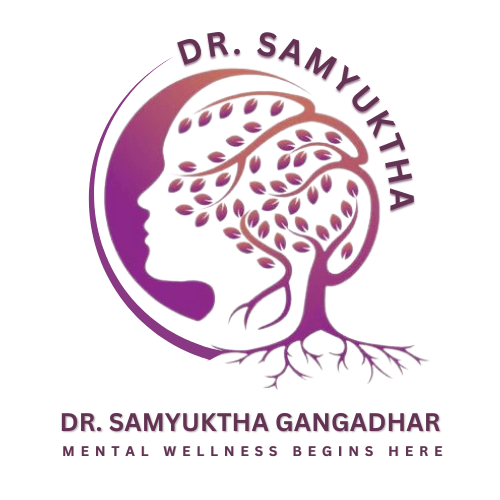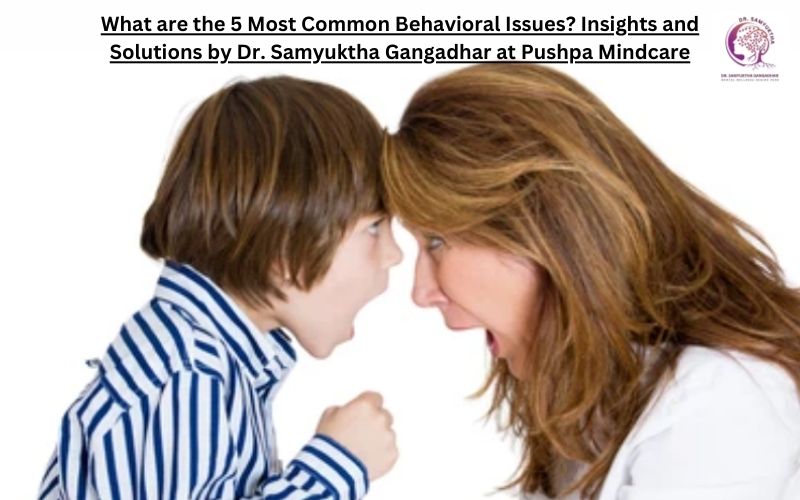Introduction
Behavioral issues in children and adolescents can be challenging for both parents and educators. Identifying and addressing these issues early on is crucial for the well-being and development of the child. In this comprehensive guide, we will explore the five most common behavioral issues, their causes, and effective strategies for management. This information is provided by Dr. Samyuktha Gangadhar, M.D. (Psychiatry), an expert in the field of child and adolescent psychiatry based in Kolkata and Bangalore.
Understanding Behavioral Issues
Behavioral issues are actions or attitudes exhibited by children and adolescents that are disruptive or inappropriate for their age and developmental stage. These issues can stem from various factors, including genetic predisposition, environmental influences, and psychological conditions. Early intervention and appropriate management are essential to mitigate the impact of these issues on a child’s life.
1. Attention-Deficit/Hyperactivity Disorder (ADHD)

Overview
ADHD is one of the most prevalent behavioral disorders found in children. It is characterized by symptoms of inattention, hyperactivity, and impulsivity. Children with ADHD may struggle with staying focused, following instructions, and controlling their impulses.
Causes
The exact cause of ADHD remains unclear, but it is generally considered to result from a combination of genetic and environmental influences. Studies indicate that children with a family history of ADHD are at a higher risk of developing the disorder. Additionally, prenatal exposure to tobacco, alcohol, and other substances can increase the risk.
Management Strategies
- Behavioral Therapy: Cognitive-behavioral therapy (CBT) can help children develop coping strategies and improve their focus and behavior.
- Medication: Stimulant medications, including methylphenidate and amphetamines, are often prescribed to help manage ADHD symptoms.
- Parent Training: Educating parents on effective discipline techniques and ways to support their child’s development can be beneficial.
Expert Opinion
According to Dr. Samyuktha Gangadhar, “Early diagnosis and intervention are crucial for children with ADHD. With the right support and treatment, children can learn to manage their symptoms and lead productive lives.”
2. Oppositional Defiant Disorder (ODD)

Overview
ODD is characterized by a persistent pattern of angry, irritable, and defiant behavior toward authority figures. Children with ODD may frequently argue with adults, refuse to comply with rules, and deliberately annoy others.
Causes
ODD can result from a combination of genetic, environmental, and psychological factors. Children with a family history of mood disorders or ADHD are at a higher risk. Inconsistent discipline, lack of supervision, and exposure to violence can also contribute to the development of ODD.
Management Strategies
- Behavioral Therapy: Therapy can help children develop better communication and problem-solving skills.
- Parent-Child Interaction Therapy (PCIT): This therapy focuses on improving the quality of the parent-child relationship and changing parent-child interaction patterns.
- Consistent Discipline: Establishing clear and consistent rules and consequences is essential for managing ODD.
Expert Opinion
Dr. Gangadhar emphasizes, “Consistency in discipline and positive reinforcement are key to managing oppositional defiant disorder. Parents should work closely with mental health professionals to develop effective strategies.”
3. Conduct Disorder

Overview
Conduct disorder involves a pattern of behavior in which a child consistently violates the rights of others and societal norms. This may include aggressive behavior, destruction of property, deceitfulness, and serious violations of rules.
Causes
The development of conduct disorder is influenced by genetic, environmental, and social factors. A family history of mental health disorders, exposure to substance abuse, and a dysfunctional family environment are significant risk factors.
Management Strategies
- Therapy: Individual therapy, family therapy, and group therapy can help address the underlying issues and improve behavior.
- School-Based Programs: These programs aim to improve social skills and academic performance.
- Medication: In some cases, medication may be prescribed to manage co-occurring conditions such as ADHD or depression.
Expert Opinion
“Conduct disorder requires a comprehensive treatment approach that involves the child, family, and school,” says Dr. Gangadhar. “Early intervention can prevent the escalation of aggressive and antisocial behavior.”
4. Anxiety Disorders

Overview
Anxiety disorders are common among children and adolescents, manifesting as excessive fear, worry, or nervousness. Common types include generalized anxiety disorder, separation anxiety disorder, and social anxiety disorder.
Causes
Anxiety disorders can be caused by a combination of genetic predisposition, brain chemistry, and environmental factors. Stressful or traumatic events, family history of anxiety, and overprotective parenting can contribute to the development of anxiety disorders.
Management Strategies
- Cognitive-Behavioral Therapy (CBT): CBT is effective in helping children identify and manage their anxiety triggers.
- Medication: Antidepressants and anti-anxiety medications may be prescribed in severe cases.
- Mindfulness and Relaxation Techniques: These techniques can help children manage their anxiety and improve their overall well-being.
Expert Opinion
“Anxiety disorders can significantly impact a child’s daily life and development,” notes Dr. Gangadhar. “It’s important to address these issues early with appropriate therapy and support.”
5. Depression

Overview
Depression in children and adolescents is characterized by persistent feelings of sadness, hopelessness, and a lack of interest in activities. It can affect a child’s academic performance, social interactions, and overall quality of life.
Causes
The causes of depression are complex and varied, including genetic, biological, environmental, and psychological factors. A family history of depression, chronic illness, trauma, and significant life changes can increase the risk.
Management Strategies
- Therapy: Cognitive-behavioral therapy (CBT) and interpersonal therapy (IPT) are effective in treating depression.
- Medication: Antidepressants can be prescribed to help alleviate symptoms.
- Lifestyle Changes: Encouraging physical activity, healthy eating, and sufficient sleep can improve mood and overall health.
Expert Opinion
Dr. Gangadhar states, “Depression is a serious condition that requires prompt attention. With the right treatment and support, children can recover and lead fulfilling lives.”
Conclusion
Behavioral issues in children and adolescents are complex and multifaceted, but with early intervention and appropriate management, positive outcomes are possible. Understanding the causes and implementing effective strategies can make a significant difference in the lives of affected children and their families. If you suspect that your child is experiencing behavioral issues, it is important to seek professional help. Dr. Samyuktha Gangadhar, M.D. (Psychiatry), is dedicated to providing comprehensive care for children and adolescents in Kolkata and Bangalore.
FAQs
At Pushpa Mindcare, led by Dr. Samyuktha Gangadhar, the best treatment includes:
- Behavioral Therapy: Cognitive-Behavioral Therapy (CBT) to develop healthier coping mechanisms.
- Medication: Stimulants, antidepressants, or antipsychotics when necessary.
- Parental Training: Programs to help manage and improve the parent-child relationship.
- Educational Support: Collaboration with schools for necessary support.
- Lifestyle Changes: Encouraging regular physical activity, a balanced diet, and sufficient sleep.
To effectively deal with behavioral issues:
- Seek Early Intervention: Professional help as soon as issues arise.
- Maintain Consistent Discipline: Clear and consistent rules and consequences.
- Use Positive Reinforcement: Reward and encourage positive behavior.
- Communicate Effectively: Open and honest communication with your child.
- Engage Professional Support: Comprehensive support from mental health professionals at Pushpa Mindcare.
Solutions to bad behavior at Pushpa Mindcare include:
- Behavioral Interventions: Tailored strategies like CBT.
- Parental Guidance: Training for constructive handling of bad behavior.
- Structured Environment: Establishing a routine.
- Social Skills Training: Developing positive interaction skills.
- Emotional Regulation: Techniques like mindfulness and relaxation exercises.
Pushpa Mindcare, under Dr. Samyuktha Gangadhar, offers personalized care for effectively managing and improving behavioral issues in children and adolescents.

